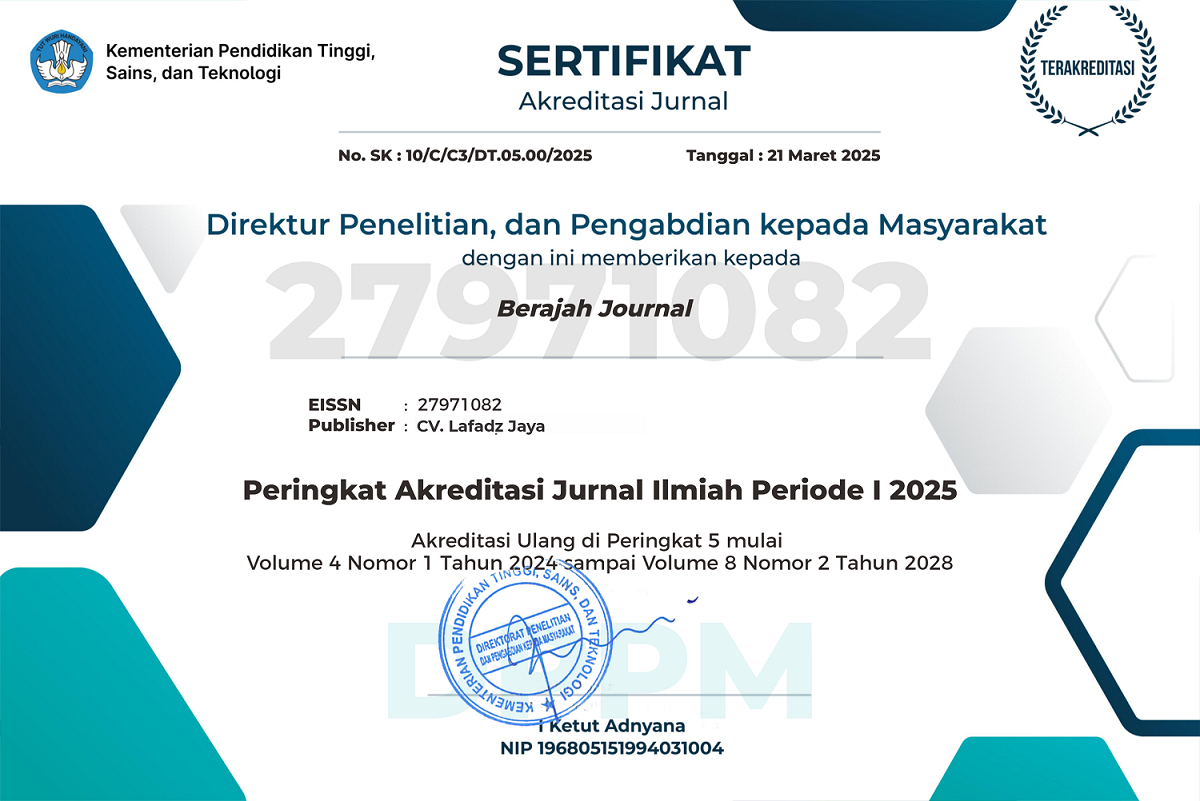PENGARUH ARUS KAS DAN PERTUMBUHAN LABA TERHADAP STABILITAS FINANCIAL EMITEN KONSTRUKSI DI BURSA EFEK INDONESIA YANG DI MODERASI PERAN EFISIENSI OPERASIONAL
DOI:
https://doi.org/10.47353/bj.v5i3.614Keywords:
Operational Efficiency, Cash Flow, Profit Growth, Financial Stability, Construction Issuers and the Indonesia Stock ExchangeAbstract
This study aims to examine how operational efficiency is perceived to moderate the influence of cash flow and profit growth on the financial stability of companies, particularly in construction companies listed on the Indonesia Stock Exchange (IDX). The approach used is qualitative, based on literature review and conceptual analysis. The results indicate that cash flow is considered a key indicator of business sustainability in the construction sector, while profit growth is understood as a signal of managerial success that requires critical examination. Operational efficiency, which encompasses cost control, project management, and technology utilization, plays a significant role in strengthening the positive impact of cash flow and profit on financial stability. However, contextual factors such as project delays, regulations, and material price fluctuations also influence the effectiveness of this relationship. This study emphasizes the importance of efficiency as an adaptive strategy in building long-term financial resilience in the dynamic and high-risk construction sector.
Downloads
References
Boell, S. K., & Cecez-Kecmanovic, D. (2018). A Hermeneutic Approach for Conducting Literature Reviews and Literature Searches. Communications of the Association for Information Systems, 34(1), 257–286.
Braun, V., & Clarke, V. (2019). Reflecting on Reflexive Thematic Analysis. Qualitative Research in Sport, Exercise and Health, 11(4), 589–597.
Brigham, E. F., & Houston, J. F. (2019). Fundamentals of Financial Management (15th ed.). Cengage Learning.
Creswell, J. W., & Creswell, J. D. (2018). Research Design: Qualitative, Quantitative, and Mixed Methods Approaches (5th ed.). SAGE Publications.
Gunawan, A., & Sari, N. (2019). Pengaruh Efisiensi Operasional terhadap Profitabilitas Perusahaan Manufaktur. Jurnal Ekonomi dan Bisnis, 22(1), 56–67.
Hanafi, M. M., & Yuliana, D. (2021). Analisis Arus Kas Operasi terhadap Stabilitas Keuangan Perusahaan. Jurnal Manajemen dan Keuangan, 10(2), 121–135.
Horngren, C. T., Datar, S. M., Rajan, M. V., & Foster, G. (2018). Cost Accounting: A Managerial Emphasis (16th ed.). Pearson.
Kieso, D. E., Weygandt, J. J., & Warfield, T. D. (2019). Intermediate Accounting (17th ed.). Wiley.
Kitchenham, B., & Charters, S. (2020). Guidelines for Performing Systematic Literature Reviews in Software Engineering. EBSE Technical Report.
Nowell, L. S., Norris, J. M., White, D. E., & Moules, N. J. (2017). Thematic Analysis: Striving to Meet the Trustworthiness Criteria. International Journal of Qualitative Methods, 16(1), 1–13.
Pradipta, R., & Yuniarti, R. (2020). Pengaruh Arus Kas dan Profitabilitas terhadap Stabilitas Keuangan Perusahaan Sektor Konstruksi. Jurnal Ilmiah Akuntansi, 19(2), 102–110.
Rahmawati, T. (2022). Efisiensi Biaya dan Likuiditas pada Perusahaan Perdagangan di Indonesia. Jurnal Akuntansi dan Keuangan Indonesia, 19(1), 78–89.
Scott, W. R. (2020). Financial Accounting Theory (8th ed.). Pearson.
Snyder, H. (2019). Literature Review as a Research Methodology: An Overview and Guidelines. Journal of Business Research, 104, 333–339.
Sutrisno, E. (2020). Pengaruh Pertumbuhan Laba terhadap Kinerja Keuangan Perusahaan. Jurnal Keuangan dan Perbankan, 24(3), 301–313.
Widarjo, W., & Setiawan, D. (2018). Financial Stability and Cash Flow: Evidence from Indonesian Companies. Asian Journal of Accounting Research, 3(1), 12–24.
Downloads
Published
How to Cite
Issue
Section
License
Copyright (c) 2025 Kembang Nauli, Donalson Silalahi, Kornel Munthe, Ruth Ansella Thalita Hulu, Adriana Theresia Br Barus

This work is licensed under a Creative Commons Attribution 4.0 International License.






















